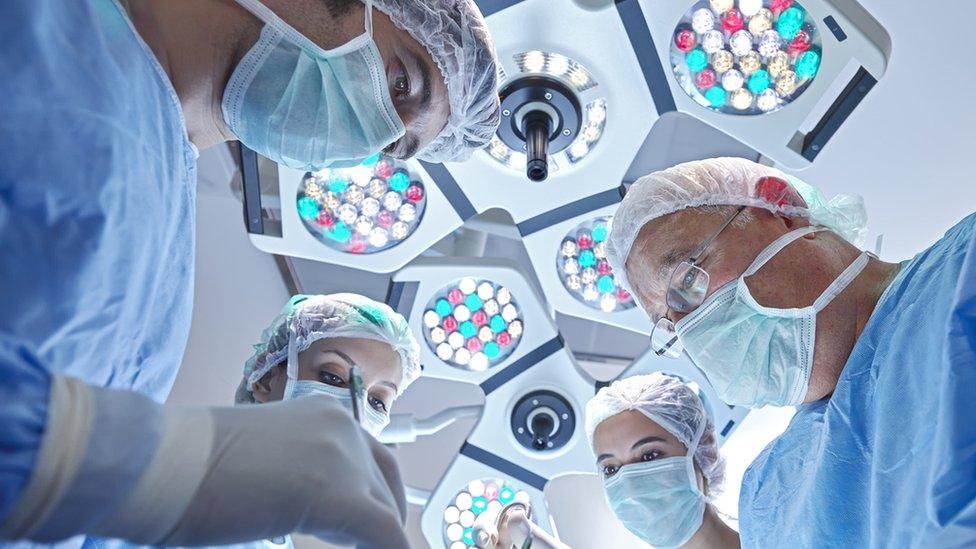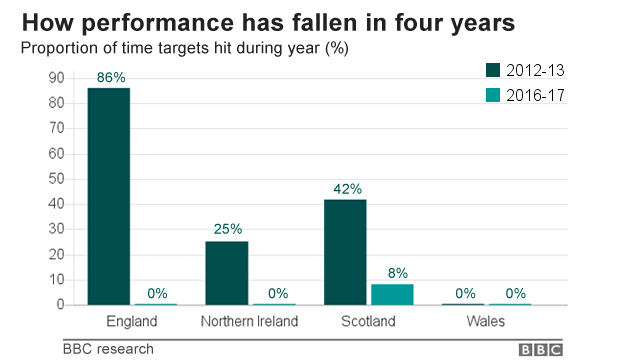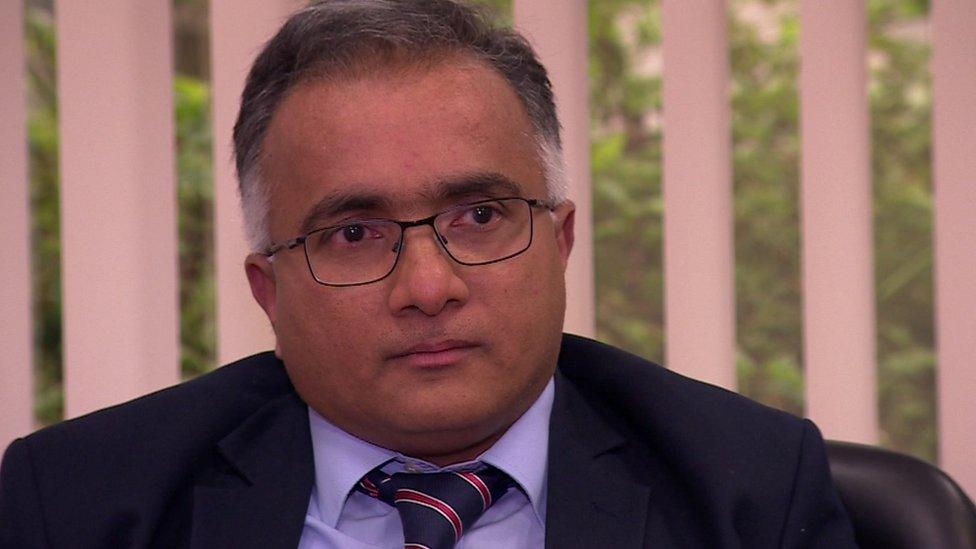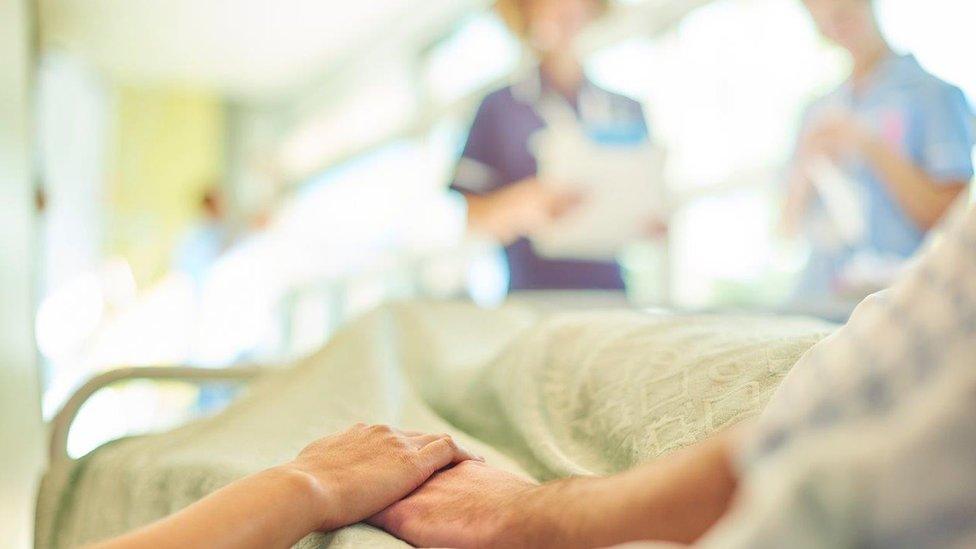Jeremy Hunt: We must do better on NHS waiting times
- Published

Health Secretary Jeremy Hunt has admitted the health service in England must improve its record on waiting times after a BBC analysis revealed key targets were being missed en masse.
Mr Hunt said he was committed to meeting the cancer, A&E and routine operations targets again.
It is 18 months since any of them have been hit after a rapid deterioration in waiting times over the past four years.
The findings have been highlighted by the BBC as it launched its NHS Tracker.
The online tracker provides users with information about how their local hospital service is performing, wherever they live in the UK, on three key targets:
Four-hour A&E waits
62-day cancer treatment
Planned operations and care
If you can't see the NHS Tracker, click or tap here, external.

The figures highlighted by the BBC on Wednesday showed England was meeting the key targets 86% of the time in 2012-13, but over the past 12 months it has not hit any.
Mr Hunt told the BBC: "We've got to do a lot to improve our system. We are absolutely committed to meeting our waiting-time standards."
He said the targets should stay as they provided "good discipline" in the system - and there were other targets, including some covering cancer, that were being met.
But he said waiting times were not the only thing that mattered to patients, pointing out measures such as cancer survival and quality of care remained high.

England was not alone in seeing declining performance.
Wales has not met any of its targets since 2010, while Northern Ireland last achieved one in 2013.
Scotland was the only part of the UK to reach a target in the past year - A&E three times over the summer.
Hospital staff the BBC has talked to have described how shortages of doctors and nurses, a lack of money and inadequate room in A&E departments in particular was making it difficult, sometimes impossible, to see patients quickly enough.
While overall the vast majority of people are still being seen in time, the BBC investigation shows how declining performance is affecting patients.
For example, the chances of not being seen in four hours in A&E has actually more than doubled in the past four years, with one in nine patients now waiting longer than that.
'We don't have enough doctors'

Cancer doctor Prof Madhusudan suggests there are not enough staff to see the patients quickly enough
Prof Srinivasan Madhusudan, head of cancer at Nottingham University Hospitals NHS Trust, which has not hit the cancer target since April 2014, suggested there were simply not enough staff to cope.
"When I get to work I want to treat my patients as soon as I can. So do my colleagues."
But he added there was a limit to what could be done, pointing out there are 5,000 new cases a year at his hospital trust.
"There are only so many patients that you can treat.
"We have a team of 22 fantastic oncologists who are working very hard to do the best they can under what is quite a stressful situation."
Meanwhile, Ali Refson, an A&E consultant at London's Northwick Park hospital, said demand was "incredibly high" which meant it was very hard to hit the four-hour goal.
"We sometimes feel we can't give the best care. We are working the hardest we can, but we are only human."
What does this mean for patients?

Ministers across the UK have been quick to point out that most people are still being seen in time.
But the numbers waiting longer for care have been rising.
In A&E patients are now twice as likely to wait more than four hours than they were four years ago - 11% compared with 5%.
The proportion of people waiting more than 62 days for cancer treatment has risen by a third in the past four years. Nearly one in five patients now waits longer.
The chances of delays before you have a planned operation or treatment, such as a hip replacement, has increased by nearly three-quarters in four years. Currently 12% of patients wait longer than they should.
It means there are now more than 500,000 people on hospital waiting lists in England, Wales and Northern Ireland that have waited too long, by the standards set out. That compares with fewer than 230,000 four years ago.
British Medical Association chairman Dr Chaand Nagpaul said the situation highlighted by the BBC was "unacceptable".
He said while for some patients the delays were simply an "inconvenience", for many more they would have a "real impact on their treatment and outcome".
Labour's shadow health secretary in England, John Ashworth, called the decline in performance "staggering".
Saffron Cordery, of NHS Providers, which represents hospital bosses, said it was time to consider whether these targets were still achievable if no more money was provided.
"It's time for an honest debate about what we can realistically expect the health service to deliver in such difficult circumstances."

Are you a patient currently facing a long wait for treatment? Or perhaps you work in the NHS? Share your views and experiences by emailing haveyoursay@bbc.co.uk, external.
Please include a contact number if you are willing to speak to a BBC journalist. You can also contact us in the following ways:
WhatsApp: +447555 173285
Tweet: @BBC_HaveYourSay, external
Send pictures/video to yourpics@bbc.co.uk, external
Send an SMS or MMS to 61124 or +44 7624 800 100